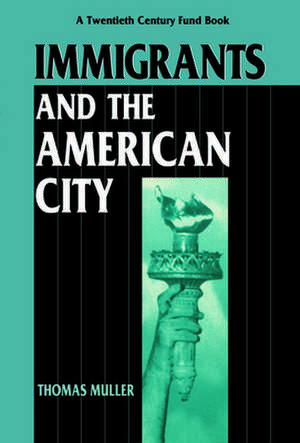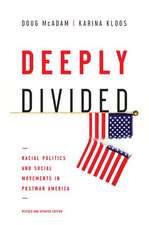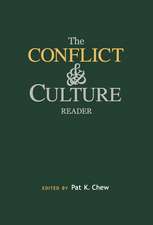Immigrants and the American City
Autor Thomas Mulleren Limba Engleză Paperback – 28 feb 1994
Preț: 244.90 lei
Nou
Puncte Express: 367
Preț estimativ în valută:
46.86€ • 48.93$ • 38.78£
46.86€ • 48.93$ • 38.78£
Carte tipărită la comandă
Livrare economică 04-18 aprilie
Preluare comenzi: 021 569.72.76
Specificații
ISBN-13: 9780814755068
ISBN-10: 0814755062
Pagini: 384
Dimensiuni: 152 x 229 x 15 mm
Greutate: 0.49 kg
Ediția:Revised
Editura: MI – New York University
ISBN-10: 0814755062
Pagini: 384
Dimensiuni: 152 x 229 x 15 mm
Greutate: 0.49 kg
Ediția:Revised
Editura: MI – New York University
Recenzii
"An important and valuable book for policy-maker and layman alike. . . . More than any other recent treatment of the subject, Immigrants and the American City gathers all the available evidence, and addresses all the important questions - and counterquestions - about immigration. And while arguing cogently for his own pro-immigration position, Muller affords the reader ample opportunity to decide for himself. In any public policy area, such a book stands out as an achievement. In immigration, it verges on being an inspiration.
- The Washington Post Book World "With superb use of a variety of analytical tools, Muller amply demonstrates that immigration did a great deal to create the economic and social vitality of America's `gateway cities,' while immigration restriction, coupled with middle-class flight to the suburbs, contributed to the rapid deterioration of those same centers after the 1920s. The increase in and changing nature of immigration after the 1960s has once again made the cities into immigrant centers, with positive results in business and job creation and the revitalization of whole neighborhoods. Although the cities have paid a price, especially in conflict between immigrants and domestic minorities, Muller argues the benefits accrued have been far more substantial than the costs."
- Choice"An important, well-researched, and thoughtful book on one of the key issues on the American domestic agenda."
- Nathan Glazer, Harvard University "A timely and important study of immigration into the United States, a vital topic that will not go away."
- Kenneth E. Boulding, University of Colorado
- The Washington Post Book World "With superb use of a variety of analytical tools, Muller amply demonstrates that immigration did a great deal to create the economic and social vitality of America's `gateway cities,' while immigration restriction, coupled with middle-class flight to the suburbs, contributed to the rapid deterioration of those same centers after the 1920s. The increase in and changing nature of immigration after the 1960s has once again made the cities into immigrant centers, with positive results in business and job creation and the revitalization of whole neighborhoods. Although the cities have paid a price, especially in conflict between immigrants and domestic minorities, Muller argues the benefits accrued have been far more substantial than the costs."
- Choice"An important, well-researched, and thoughtful book on one of the key issues on the American domestic agenda."
- Nathan Glazer, Harvard University "A timely and important study of immigration into the United States, a vital topic that will not go away."
- Kenneth E. Boulding, University of Colorado
Textul de pe ultima copertă
American immigrants are often considered symbols of hope and promise. Presidential candidates point to their immigrant roots, Ellis Island is celebrated as a national monument, and "the melting pot" remains a popular, if somewhat tarnished, American analogy. At the same time, images of impoverished Mexicans swarming across the Mexican-American border and boat-loads of desperate Haitian and urban refugees depict America as a nation under siege. While governments and business interests generally welcome aliens for the economic benefits the generate, the success of these groups paradoxically stirs distrust and envy leading to discrimination, oppression, and, in some cases, deportation. Surveying the political and economic history of American immigration, Thomas Muller compellingly argues that the clamor at America's gate should be a cause of pride, not anxiety; a sign of vigor, not an omen of decline. Illustrating that recent waves of immigration have facilitated urban renewal, Muller emphasizes the many ways in which aliens have lessened our cities' social problems rather than contributing to them. Los Angeles, New York, Miami, and San Francisco, traditional gateways to other continents, have all benefited from the contributions of immigrants. To assess perceived and actual costs of absorbing the new immigrants, Muller examines their impact on city income, housing, minority jobs, public services, and wages. But Muller argues that noneconomic concerns (such as recent attempts to formalize English as the country's official language) frequently mirror deeply rooted fears that could explain the cyclical pattern of American attitudes toward immigrants over the last three centuries. The nation, he contends, may again be turning inward, initiating a period of growing hostility toward the foreign-born. Nonetheless, higher entry levels for skilled immigrants would improve the technological standing of the U.S. increase the standard of living for the middle class, and facilitate the resurgence of our inner cities.




















